Landschlacht, Switzerland, 23 March 2017
The further away a country is, the harder it is to know and understand that country.
China is such a country.

So it is with caution that I express my opinion of the events that have so far transpired with China and its relations with the rest of the world.
Until this year I have had little exposure to Chinese people.
The only Chinese people I had known were second generation Chinese Canadians, more Canadian in character than Chinese as they have spent the entirety of their lives in Canada.

I am not certain whether they have ever visited their parents’ homeland or even if they have wished to do so.
I have nothing against the three Chinese Canadians I have known, though whether they feel the same towards me remains debateable.
I know that Dicky and I have become more closer since our high school days and that he seems happy back in his hometown of Lachute and working for Air Canada at the Pierre Elliot Trudeau Airport in Montréal.
I am fairly certain that Walter from my college days became the international lawyer he wanted to be, though whether he returned to Québec City I do not know.
Things had ended badly between us and the only excuse I have in my pitiful defence is that we had known one another at a most difficult and painful time of my life.
Nonetheless I wish him much happiness and success but I don’t anticipate a happy reunion betweeen us anytime soon.
I am not at all sure where Jack, whom I knew from my travelling days, is or what he is doing these days.
I remember his face and stature as if he had been seen only mere moments before, but whether he found whatever he was searching for in his travels I know not.
Here in Switzerland I teach a young lady from Beijing twice a week and I occasionally meet another Chinese woman who works for a company I teach at once every two weeks.

These two ladies have awakened within me a curiosity to know more about their homeland, but I remain uncertain about how I feel about visiting China one day.
As tourism goes, of course, there is much that attracts me about China…
I would love to walk the Great Wall, visit Beijing’s ancient Forbidden City and Summer Palace, parade amongst the army of terracotta warriors, explore the lush rainforest of Xishuangbanna, take in the sights and scents of Guangzhou’s evening spice markets, listen to the talented Chinese National Orchestra in live performance, watch a Zhang Yimou film without English subtitles, eat duck in Beijing followed by chá at a teahouse where my appearance might increase the level of gossip and intrigue within, hug a panda (if such a thing is even possible), dodge yet another of the endless array of construction sites, sigh as yet another Chinese student tries to practice his English upon me, gaze nervously at Tiananmen Square fearful that my rebellious thoughts betray me, wonder at a country which doesn’t only include an endless sea of Han Chinese but as well 55 other officially recognised ethnic groups…so much to see and experience one hardly knows where to begin.





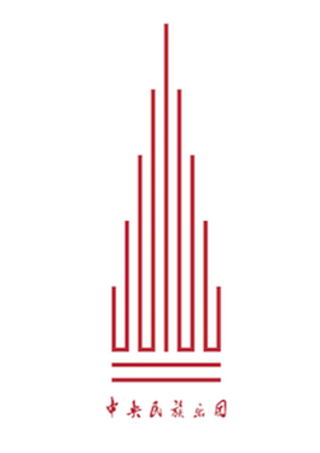

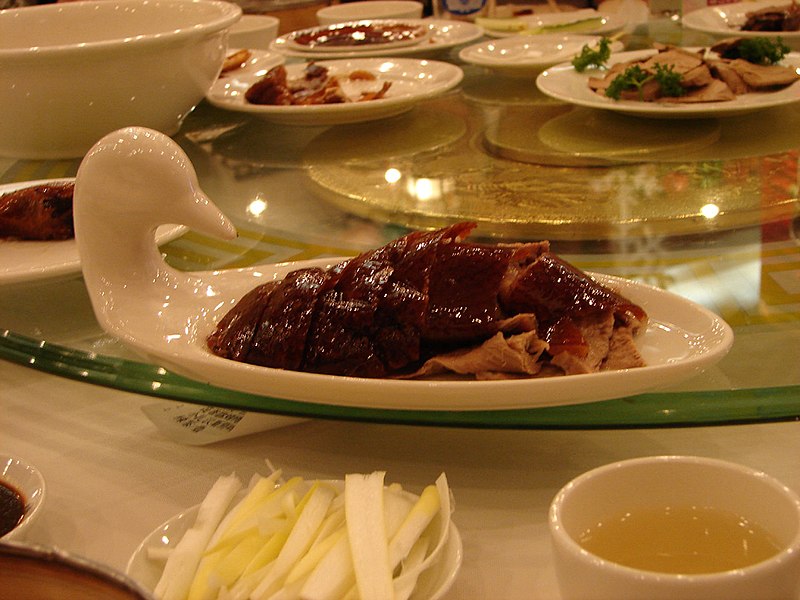
Above: (from top to bottom) The Great Wall, The Forbidden City, The Terracotta Army, the tropical rain forest of Xishuangbanna, the skyline of Guangzhou, the logo of the Chinese National Traditional Orchestra, poster of Zhang Yimou’s 1991 film Raise the Red Lantern, Peking duck, the Yu Yuan Garden Teahouse of Shanghai, a giant panda bear in Hong Kong Zoo, Tiananmen Square
(I am curious about the rumor that generations of Chinese are still convinced that Western music is the Carpenters, Richard Clayderman, Kenny G and Lionel Richie and what the concert goers to Wham!’s Freedom Tour actually felt and understood.)



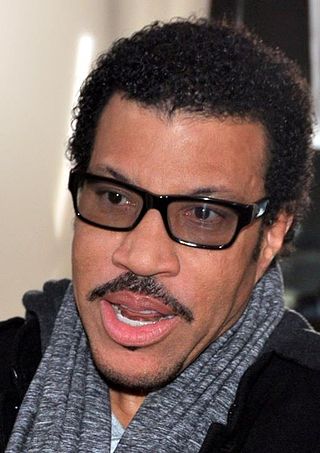

Above: (from top to bottom) US musicians Karen and Richard Carpenter at the White House in 1971, French pianist Richard Clayderman (née Philip Pagès), US saxophonist Kenny G. (née Kenny Gorelick), US musician Lionel Richie and British pop duo Wham!
The little I know of China has been limited to newspapers and magazines and the occasionally travel account from writers like Paul Theroux (Riding the Iron Rooster: By Train through China) or books telling folks how to do business in China, and though this exposure has been interesting I am uncertain, despite the advent of the Internet, how accurate are these impressions.

And though I am aware that it is unfair to confuse the Chinese people with the Chinese government, much as it would be to label all Americans in the mold of Donald Trump, I must confess the politics of China does bother me, especially in regards to Taiwan and Tibet.
Why can`t the Chinese government let Taiwan go?
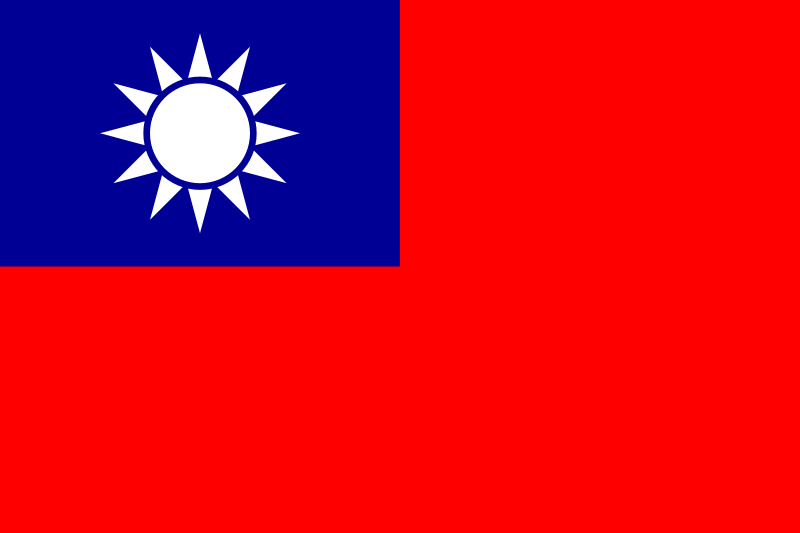
Above: Flag of Taiwan
Why must the Chinese continue to occupy Tibet?

Above: Flag of Tibet
I have met a handful of Tibetan people here in Switzerland and have read numerous accounts of the oppression that Tibet endures and the never-ending exile of their Dalai Lama and I find it difficult to reconcile my desire to see China with my sadness about the acts that are done in China’s name.
I also admit to feeling remorse about the correctness of the accusation that is often levelled at the West…
We simply don`t care about what happens outside of the West until it affects us.
Shortly before I began teaching Chinese students in St. Gallen and Herisau, I read of one Canadian couple’s experience in China and it is their tale I now wish to tell…
Vancouver, Canada, 28 June 2014
Su Bin, aka Stephen Su or Stephen Subin, the owner and manager of Beijing Lode Technology Company Ltd, an aviation technology company -based in China with offices in Vancouver, Kansas City, Beijing, Shanghai, Guangzhou, Shenzhen, Chengdu, Xi’an, Shenyang and Changchun – a cable harness equipment company that served the aviation and space market and represented and distributed related aerospace products for a number of companies – is arrested today.

Su Bin, a Chinese businessman and permanent resident of Canada allegedly hacked into the computer systems of US companies with large defence contracts, including Boeing, to steal data on military projects including some of its fighter jets.
On 27 June, the Los Angeles branch of the FBI filed a complaint outlining the alleged participation of Su Bin in a conspiracy to unlawfully access computers in the United States.
The complaint provides an in depth look at an EaaS (espionage as a service) operation.
Su’s alleged role was to help his partners identify valuable military aviation technology to steal.
His company’s logo is almost laughably ironic: “We will track the world’s aviation advanced technology.”
Lode Tech is also a representative and distributor of related aerospace products for a number of companies, including DIT-MCO of Kansas City which proudly announces that its equipment “was used on the early Hawk Missile, the first Transcontinental Atlas missile, Polaris missiles for the Navy, Titan missiles for the Air Force and the Patriot Missile used so successfully in the Desert Storm War, as well as almost all the aircraft used by the Air Force, Army and the Navy.”

Prosecutors allege that Su Bin worked with two unnamed Chinese hackers to get the data between 2009 and 2013 and that he attempted to sell some of the information to state-owned Chinese companies.
This case underscore the importance for companies in high value technologies to:
a) Conduct in depth due diligence investigations on all of their vendors.
b) Restrict network access by implementing least privilege rules.
The three hackers targeted fighter jets, such as the F-22 from Lockheed Martin and the F-35 as well as Boeing’s C-17 military cargo aircraft program.
![]()
As well, they stole 20 gigabytes of date from a US military contractor via the company’s FTP server, acquired a list of contractors and suppliers and had access to a Russian-India joint missile development program (Brahmos Aerospace?) by controlling the company’s website and “awaiting the opportunity to conduct internal penetration”.

Su Bin’s arrest marks the first time that the Federal Bureau of Investigation (FBI) has issued an arrest warrant for a foreigner charged with an act of cyber-espionage via a network attack that had until now been attributed to states.

While this is the first criminal complaint that describes “hackers for hire” or espionage-as-a-service, this type of criminal activity is neither new nor exclusive to China.
Hackers for hire operate in the following manner:
Their target selection is determined by the science and technology priorities of their potential customers.
The hackers establish “technology bases” and hop servers outside of their native nation and “machine rooms” with legal status in cities back home.
They focus on those contractors which are among the top 50 arms companies.
Cyber security companies who research cyber threats should study this criminal complaint closely.
Intelligence companies worldwide need to find ways to differentiate the activities of a nation-state with those of a for-profit hacker group, criminal organization or other alternative entities engaging in acts of cyber espionage.
US Department of Justice spokesman Marc Raimondi said that the conspirators are alleged to have accessed the computer networks of US defence contractors without authorization and stolen data related to military aircraft and weapons systems.
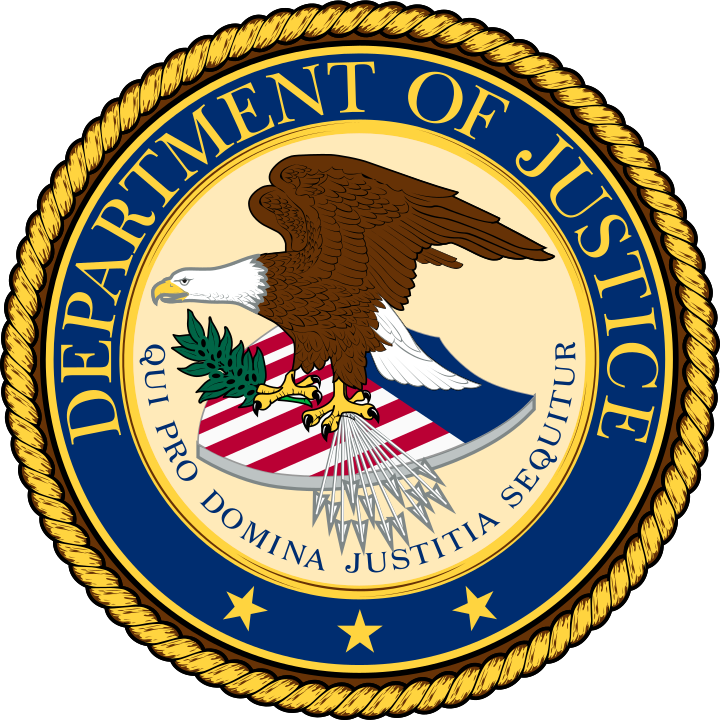
“We remain deeply concerned about cyber-enabled theft of sensitive information and we have repeatedly made it clear that the United States will continue using all the tools our government possesses to strengthen cyber security and confront cybercrime.”
Boeing said in a statement that the company cooperated with investigators and will continue to do so to hold accountable “individuals who perpetrate economic espionage or trade secret theft against US companies.”

“We appreciate that the government brought its concerns about a potential compromise of our protected computer systems to our attention.”
None of the claims have been proven in court.
The New York Times reported that Chinese hackers broke into the computer networks of the Office of Personnel Management earlier in March with the intention of accessing the files of thousands of federal employees who had applied for top secret security clearances.

The hackers gained access to some of the agency`s databases before the threat was detected and blocked.
The Chinese community in Canada is one of the largest overseas Chinese communities, the 2nd largest overseas Chinese community in North America after the United States and the 7th largest worldwide.
Canadians of Chinese descent make up about 4% of the Canadian population, or 1.3 million people.
The Chinese Canadian community is the largest ethnic group of Asian Canadians – 40% of the Asian Canadian population.
Chinese have been a part of the Canadian mosaic as early as 1788.
The highest concentration of Chinese Canadians is in Vancouver, where 1 in 5 residents is Chinese, prompting other Canadians to nickname Vancouver “Hongcouver”.

According to the Canadian Ethnic Diversity Survey of 2002, 76% of Chinese Canadians said they had a strong sense of belonging to Canada, yet maintaining a strong sense of belonging to their ethnic culture.
Chinese Canadians are active in Canadian society.
Many of them vote in federal and provincial elections and participate in gatherings such as sports teams or community organizations.
Sadly 1 in 3 Chinese Canadians reported that they had experienced discrimination, prejudice or unfair treatment based on their ethnicity, race, religion, language or accent.
Dandong, China, 4 August 2014
An obscure port tucked away in the corner of southeastern Liaoning Province at the confluence of the Yalu River and the Yellow Sea, Dandong‘s interest to travellers lies in the city’s proximity to North Korea and its convenience as a departure point for the Changbai Shan Nature Reserve eight hours distant by bus.
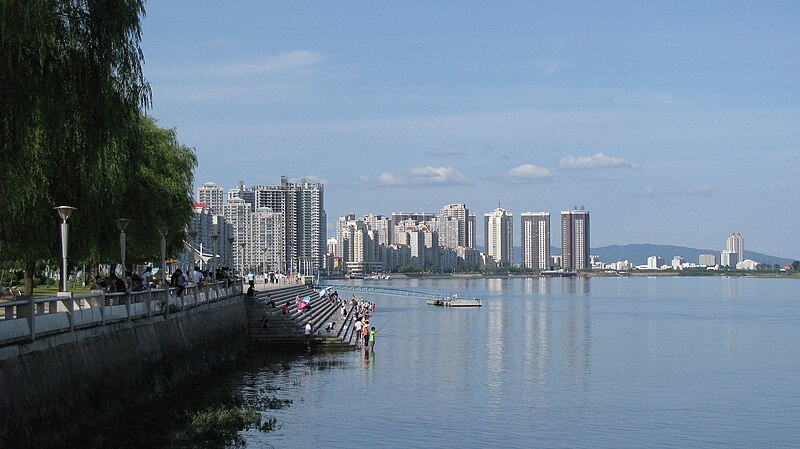
The North Korean city of Sinuiju (Chinese: Xinyizhou) lies on the other side of the Yalu River, so the Chinese come to Dandong (“red east”) just to see the border of their country.

Above: Flag of North Korea, or the Democratic People’s Republic of Korea
A strong Korean influence can be felt in Dandong, from shops to restaurants.
Yalujiang Park is an appealing riverfront park that is a favourite with tourists posing for the standard “I visited the Sino-Korean border.” shot.
After the start of the First Sino-Japanese War in 1894, this region was occupied by Japan who built an iron bridge leading to North Korea.
From November 1950 to February 1951, this bridge along with a younger Sino-Korean Friendship Bridge was “accidentally” bombed by the United States during the Korean War.
(Americans also “accidentally” bombed the airstrip at Dandong.)
Even though the Sino-Korean Friendship Bridge was rebuilt, the remains of the Japanese-built iron bridge remain and now serve as a war monument.
The Koreans dismantled the Japanese bridge as far as the mid-river boundary line, leaving only a row of support columns.
On the Chinese side, tourists can wander along the remains of the original Broken Bridge, from dawn to dusk, and see shrapnel pockmarks along the bridge until it ends mid-river.
The Sino-Korean Friendship Bridge runs parallel to the remains of the Japanese bridge.
The Korean War, from the Chinese and North Korean perspectives, is recorded in the city’s huge macabre Museum to Commemorate Aiding Korea Against US Aggression in a compound northwest of the city, close to the 53-metre high square column Resist America, Aid Korea Memorial.
This gleaming museum, built in 1993, has nine exhibition halls on the Korean War, full of maps, plans, dioramas, machine guns, hand grenades, gory photographs, “Defeat Wolf-hearted America” spelled out on marble, a trench simulation, an impressive revolving panorama showing Korean and Chinese soldiers hammering American aggressors, North Korean folk art including dolls and children’s shoes and statues of valiant Chinese and Korean soldiers.

Everything is labelled in Chinese and Korean, with the exception of the Chinese propaganda leaflets dropped behind enemy lines in which worried American wives wonder what their husbands are fighting for, and the United Nations official declaration of war – the only written record in the entire museum that mentions the small trifling detail that it was the North Koreans who kicked off the War by invading the South.
A couple of MiGs and Red Army tanks sit in a compound to the side of the Museum.
At the entrance to the compound, next to Chinese President Jiang Ze Min’s large plaque of calligraphy swearing eternal Sino-North Korean friendship, ice-cold Coca-Colas are for sale.
Behind the Museum, a gleaming structure marks a graveyard containing the remains of more than 10,000 Chinese soldiers.
The promenade along the Yalu River is packed with games, parks, modern restaurants offering freshwater fish or Korean barbeque and the Hong Kong Coffee House with strong Korean coffee and the latest North Korean news on TV.
One of Dandong’s top-rated destinations on TripAdvisor is Peter`s Coffee House, owned by Julia and Kevin Garratt of Vancouver and named after one of their sons.

Peter’s Coffee House is a hub for expats, local Chinese curious about the outside world, state security agents suspicious of the staff and customers, and the occasional North American diplomat.

“Down by the riverfront Peter`s Coffee House, at 103 Binjiang Zhong Lu, open from 0800 to 2200, Monday to Saturday, noon to 2200 on Sunday, is a friendly café run by a longterm Canadian expat family.
In addition to its excellent coffee, Peter`s serves milkshakes and sodas, authentic Western baked goods, a fine all-day breakfast, burgers and sandwiches.
This is also the place to go for local information and restaurant recommendations.” (www.peterscoffeehouse.com)

Canadian Christian aid workers Julia and Kevin Garratt lived in China on and off for 30 years, raised their four children there and moved their family from Vancouver to Dandong in 2007.

Julia taught international trade and management at a local university while Kevin ran the café, organizing weekly “English Corner” language exchanges.
In their spare time, the Garratts volunteered around Dandong, often taking Chinese orphans ice skating.
The Garratts wanted to address the suffering of those living across the border by providing aid to orphanages and a school for the disabled in North Korea.
The Garratts considered China their home, as do the 300,000 Canadians living in China.
(Most Canadians live in Hong Kong, Beijing or Shanghai, so it can be imagined that the gritty border town of Dandong might have regarded the Garratts as highly unusual but generally not unwelcome.
For two Canadians remain etched in Chinese consciousness: Dr. Henry Norman Bethune and Dashan.
Norman Bethune (1890 – 1939) was a Canadian physician, medical innovator and noted anti-fascist.
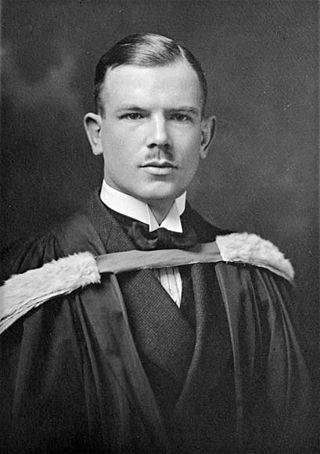
Above: Dr. Norman Bethune (1890 – 1930)
He first came to international prominence for his service as a frontline surgeon supporting the democratically-elected Republican government and their Loyalist troops during the Spanish Civil War, but it was his service with the Communist Eighth Route Army during the Second Sino-Japanese War that would earn him enduring acclaim.
Dr. Bethune effectively brought modern medicine to rural China and often treated sick villagers as much as wounded soldiers.
His selfless commitment made a profound impression on the Chinese people, especially the Communist Party of China’s leader, Chairman Mao Zedong.

Above: Chairman Mao Zedong (1893 – 1976)
The Chairman wrote a famous eulogy to Bethune, which was memorized by generations of Chinese people:
“Comrade Bethune’s spirit, his utter devotion to others without any thought of self, was shown in his great sense of responsibility in his work and his great warmheartedness towards all comrades and the people.
Every Communist must learn from him.
We must all learn the spirit of absolute selflessness from him.
With this spirit everyone can be very useful to the people.
A man’s ability may be great or small, but if he has this spirit, he is already noble-minded and pure, a man of moral integrity and above vulgar interests, a man who is of value to the people.”
Bethune is one of the few Westerners to whom China has dedicated statues, of which many have been erected in his honour throughout the country.
There are hospitals across China named after him and the Norman Bethune Medal is the highest medical honour in China.
Dashan is the Chinese stage name of Canadian Mark Henry Rowswell (born, nine days after yours truly, on 23 May 1965 in Ottawa) who works as a freelance performer in China.

Relatively unknown in the West, Dashan is the most famous Western personality in China’s media industry, where he occupies a unique position as a foreign national who has become a bona fide domestic celebrity.
Dashan is best known for his mastery of Mandarin Chinese and is considered a true cultural ambassador through his work as a TV host and stand-up comedian done in Chinese.)
This evening the Garratts were invited to a restuarant dinner by Chinese acquaintances who told them they wanted advice about how their daughter could apply to the University of Toronto.
But the dinner was a trap.
When the restaurant elevator doors opened onto a crowd of people, many holding video cameras, Julia and Kevin thought they had stumbled into a wedding party.
But this was no celebration.
In a flash, the Garratts were snatched by men and shoved into separate cars.
They did not know they were in the hands of China’s feared Ministry of State Security.
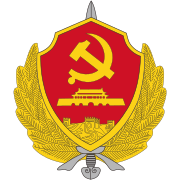
Above: Logo of the Chinese Ministry of State Security
They would not see each other for more than two years.
The men drove Julia, 55, to an office building and demanded that she sign a document stating that she agreed to be investigated.
“Investigated for what?”, Julia asked.
It was only after a translator said the words “suspect” and “spy” that Julia understood.
“I seriously thought they would realise that they had made a mistake, they would say sorry and we would go home.”
In another room, Kevin Garratt, 56, was hearing the same chilling accusations.
Scared and bewildered, the Garratts signed.
Mississauga, Ontario, Canada, 12 December 2016
Why were the Garratts taken?
The Garratts suspect they were unwitting pawns in a gambit by the Chinese government to prevent Canada from extraditing Su Bin to the United States.
Those supporting the Garratts say that the couple were simply chess pieces in a larger geopolitical skirmish.
“The Chinese made it clear that the Garratt case was designed to pressure Canada to block Su Bin’s extradition to the US.”, said James Zimmerman, an American lawyer in Beijing hired by the family to lobby Canadian and Chinese government officials for their release.
In an emailed statement about the Garratts’ detention, Global Affairs Canada, the department that handles Canada’s diplomatic relations, declined to comment on the question of an exchange, but said: “Senior government officials were raising the case at every opportunity.”

The Chinese Embassy in Ottawa denied that the Garratts’ detention was linked to Mr. Su.
“We don’t think it is related to any other cases.”, an Embassy spokesman said in an email.
The Garratts’ account provides a rare glimpse into the workings of China`s opaque state security system.
Their interrogations also reveal clues about the vast reach of China’s global espionage network and the lengths to which the Chinese government will go to protect it.
During the couple’s months-long detention, they said they were frequently threatened with execution or told that they would be sent to a North Korean gulag.
The Garratts’ experience highlights the risks nations face in engaging with China.
According to the Garratts’ account, after signing the investigation document Kevin was driven to the couple’s apartment, where agents ransacked their possessions, grilled him about the contents of their kitchen cabinets and then carted off schoolbooks and computers in the family’s suitcases.
After a heated exchange, the men allowed Kevin to take a pair of Bibles back to the detention centre.
Julia was already at the compund, an extralegal detention centre on the outskirts of the city, confined to a separate isolation cell that had a couch, a bed and a small window covered in opaque plastic.
During the next six months, neither one knew where the other was.
But neither was ever alone.
Rotating pairs of guards sat on the couch in each of these cells, staring intently at them and writing down their every move.
Harsh lights remained on 24 hours a day.
To stay sane, Julia prayed, read books provided by the Canadian Consulate and each day drew a cryptic picture of something she was grateful for in the back of her Bible, afraid anything written would be confiscated.

They each faced daily six-hour interrogations by a team of three men.
Armed with years of emails, Skype messages and surveillance records, the interrogators accused the Garratts of “hosting” foreign diplomats at their coffee shop, taking orders from Canada’s intelligence agency (the Canadian Security Intelligence Service – CSIS) and stealing state secrets.

The agents showed them photos of United States and Canadian diplomats who had visited their coffee shop.
The interrogators claimed Kevin’s photos of street scenes in Dandong and views of North Korea across the Yalu River were espionage, even though tourists on riverboats took the same photos every day.
Security officers used a variety of coercion tactics.
In one exchange, the interrogators described a 2009 meeting in Vancouver between the couple and a CSIS agent who had wanted to ensure their volunteer work in North Korea was not violating United Nations sanctions.
When Julia asked how the interrogators had known about the meeting, one of them said:
“We have people in the US, Canada, everywhere.”
Canadian officials declined to discuss the Garratts’ treatment, but the couple’s accounts squares with those of many people who have been in Chinese detention.
In February 2015, Julia was released on bail and returned to their apartment.
Meanwhile, Kevin was charged with espionage and transferred to a prison medical ward.
During the 19 months he spent there, a rumour circulated among the guards that he would be released as part of a prisoner exchange.
But in February 2016, Mr. Su waived his challenge to extradition and cut a deal with the United States.
Once that happened…
“Beijing was stuck with a weak case of espionage against the Garratts and little bargaining leverage to get much of anything out of Ottawa.”, said Mr. Zimmerman, the American lawyer.
At the end of August 2016, just days before Canadian Prime Minister Justin Trudeau arrived in Hangzhou, China, for the 11th meeting of the Group of Twenty (G20) – an international forum for governments and central bank governors from 20 major economies, with the aim of studying, reviewing and promoting high-level discussion of policy issues pertaining to the promotion of international financial stability – Julia was allowed to leave China.

Above: Canadian Prime Minister Justin Trudeau
The G20 Hangzhou summit was held on 4-5 September 2016.

Two weeks later, Kevin was taken to court, where a judge read out an eight-page guilty verdict in Chinese.
The next morning, he was put on a plane bound for Tokyo, but only after agreeing to pay more than $14,000 in fines and signing a document promising not to speak with the news media about his detention.
Much of that money had been dedicated to a North Korean orphanage.
Julia and Kevin were finally reunited in Canada in September.
Though the Garratts are now back in Canada, they say they do not feel entirely safe, describing a series of unnerving incidents suggesting that the Chinese government may be trying to keep tabs on them and their relatives.
In recent months, relatives have encountered strange interference on their phones, computers have gone haywire and strange cars parked outside their homes drive away when someone approaches.
“Even now we live under a cloud.”, Kevin Garratt said.
Most of all, the Garratts feel grief at losing the lives they built over 30 years.
“That’s the sadness that overwhelms us.
We were just trying to help people in need.
That’s all we did.”, Kevin Garratt said.
So how should businesses and governments deal with China, a country that is both a strategic partner as well as a potential adversary?
A country that is surpassing the United States as the world’s largest economy?

A country whose investment in its military continues to rapidly increase, to perhaps achieve military equality with the US in 15 to 20 years?
A one-party socialist regime with a poor human rights record?
I personally teach for three companies in Switzerland which do business in China.
China is Switzerland’s top trading partner in Asia.
There are approximately 300 Swiss firms with more than 700 branches operating in China with a total employment of over 55,000 people.
China is the second largest foreign creditor of the United States, yet US President Donald Trump continues to make comments that strain Sino-American relations and have some Americans anticipating potential trade or military conflict between China and the United States in the near future.

China is currently Canada’s second largest trading partner.
Trying to understand China feels as difficult as trying to train a dragon, but I believe if we can learn from those who have spent time there and those who have studied Chinese history and culture we might be able to find a solution that enables nations and individuals to have an economic partnership with the Chinese, while encouraging them to develop their country for all its people within their sphere of influence, improve their human rights record, govern well for the good of everyone and build a world that is safer and more secure.
If our leaders could admit that even the most capable must sometimes ask for help and that dragons need be handled carefully, then progress rather than destruction could be their legacy.
(To be continued…)

Sources: Wikipedia / Lonely Planet China / Rough Guide China / Jeffrey Carr,”Su Bin, Lode-Tech and Privatizing Cyber Espionage in the PRC”, Digital Dao (electronic blog), 14 July 2014 / CBC News, “Su Bin, Chinese man accused by FBI of hacking, in custody in BC”, 12 July 2014 / Dan Levin, “China freed Canadians, but ‘even now we live under a cloud'”, New York Times, 3 January 2017



